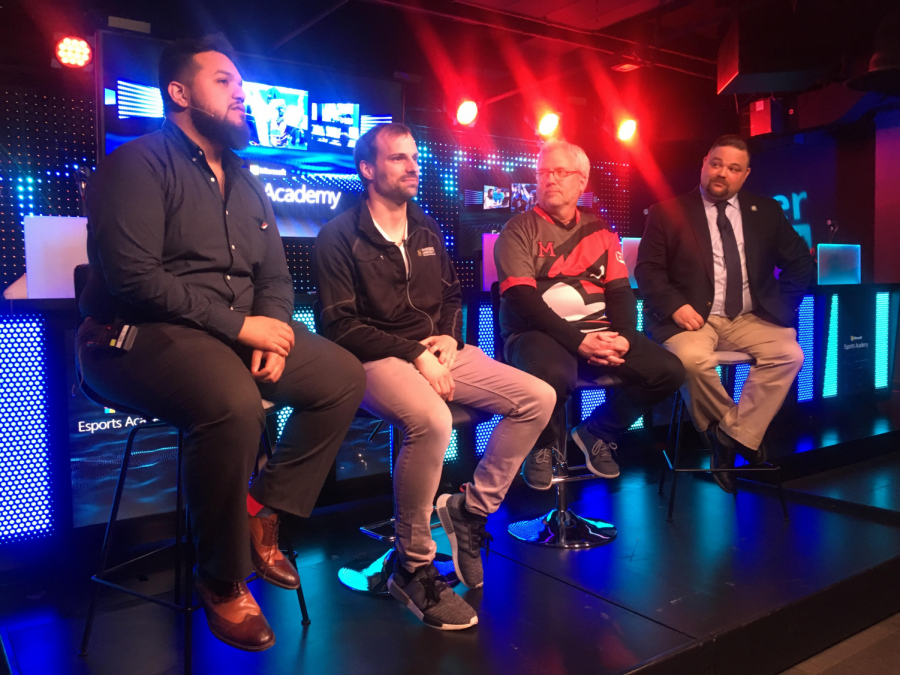Universities Invest in Growing Esports Industry Teams
Panelists speak at an esports event at the Fifth Avenue flagship Microsoft Store.
April 30, 2018
Student athletes know the pain of that last sprint, lap or rep at the end of a long and demanding practice. But what if instead of demanding physical exertion, your coach demanded the same appeal you made to your parents when playing video games late on a school night: one more level?
Over the April 21 to 22 weekend, college coaches, professional gamers and industry leaders spoke to an intimate crowd of gaming enthusiasts at Microsoft’s flagship store in New York City about why that extra level may be more valuable in the college admissions process than expected.
As global revenues from esports are expected to surpass $1 billion and with the esports fanbase expected to grow to 215 million by 2019, universities across the United States are investing heavily in the gaming world. To date, there are 78 universities that field competitive esports teams, 69 of which provide an average scholarship of $7,000 to whom Miami University of Ohio professor and esports head coach Glenn Platt described as “scholar gamers” in a panel discussion on collegiate competitive gaming.
“We want to have academics woven throughout the entire experience that you have, that you don’t see varsity sports as something different or outside of academics but actually woven together with it,” Platt said. “What our students do is be more than actual players, but we start thinking about different roles: content creators, producers, editors. There is a whole world of roles that aren’t just playing esports but being actively involved in the business of esports.”
Fellow panelist and SUNY Canton esports head coach Rob Snow further spoke to the relationship between esports and academics by emphasizing how esports has driven SUNY’s academic enhancement initiatives for online learners.
“Because of the nature of esports where we can play online, we really worked hard to cater to online learners,” Snow said. “Today, I am proud to announce that we have students from New York to Florida.”
Steven Chen, a first-year at Hunter College and attendee at the Esports Academy, said that he was interested in transferring schools to pursue esports, particularly the online multiplayer game League of Legends, in addition to his academics after listening to representatives from Miami University of Ohio, Harrisburg University and SUNY Canton speak about the esports scene at their respective institutions.
“It’s motivating to hear about these guys and what opportunities they have,” Chen said. “Right now, I’m hopefully looking into Harrisburg University and possibly joining their League [of Legends] scene. I noticed that they also have a sports psychology program specifically designed for esports, and that’ll be very exciting to make it into if I make it in.”
When asked whether or not he believes NYU will invest in esports, Gallatin senior Josh Melnick said that he was unsure given the lack of knowledge of esports by many.
“It’s hard to say,” Melnick said. “It seems at a bureaucratic level nobody really understands how esports work — they kind of think of it as one giant gaming conglomerate, and everybody is sort of involved in the same thing. I think there would have to be a pretty dramatic attitude change on the part of people who run that kind of thing. I can see it happening but there would have to be a pretty significant change.”
In addressing the debate as to whether or not esports would fall under the category of athletics, Melnick said that structural support by the university is more important than the semantics.
“I think it’s just about structural support and whether or not the athletics director or whatever is willing to support esports programmes,” Melinick said. “I think that’s definitely of the existing program at NYU. That’s definitely the infrastructure that’s most suitable to fitting esports, and even if it would be just intramural stuff, that’s still part of NYU Athletics. If people involved in the athletics department don’t want esports, then esports can be its own thing. I don’t feel really strongly; I just think there needs to be more support from wherever.”
A version of this article was published in the Monday, April 30 print edition. Email Warner Radliff at [email protected].



























































































































































